Key takeaways:
- Strong passwords are essential for protecting online accounts and financial investments, especially in crypto mining.
- A strong password should be at least 12-16 characters long, combining uppercase and lowercase letters, numbers, and special characters.
- Using unique passwords for different accounts helps prevent security breaches, ensuring that one compromised password does not jeopardize others.
- Regularly changing passwords and enabling two-factor authentication (2FA) significantly enhance online security.
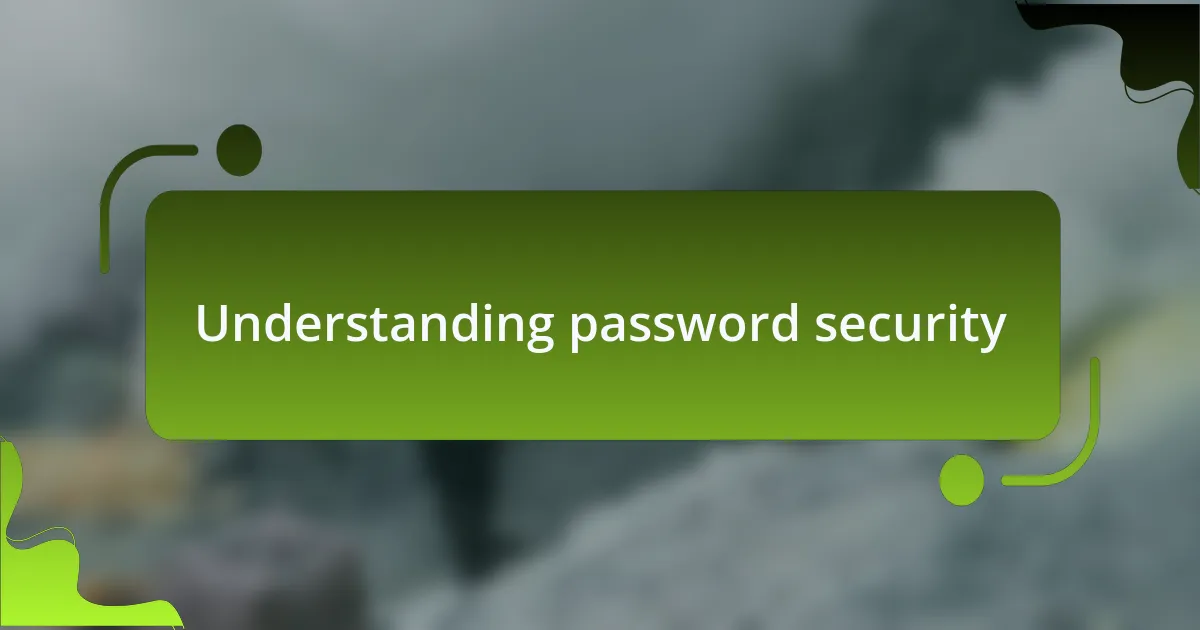
Understanding password security
Password security is essential in our digital lives, yet many underestimate its importance. I recall a time when a friend’s account was compromised simply because they used “123456” as their password. It made me realize that if we want to protect our assets, particularly in crypto mining, we must prioritize complex and unique passwords.
Consider your passwords as the gatekeepers to your digital world. Each time you log into your crypto platform, does it feel safe knowing your password is strong enough to resist attacks? Vulnerabilities exist everywhere, and even momentary lapses can lead to significant losses, making it imperative to understand the nuances of password creation.
Engaging with password security means understanding the tactics employed by hackers. After experiencing a phishing attempt, I became acutely aware of how easily someone can fall into a trap. By intentionally creating diverse passwords and enabling two-factor authentication whenever possible, I’ve taken proactive steps to safeguard my information, and I encourage you to do the same.
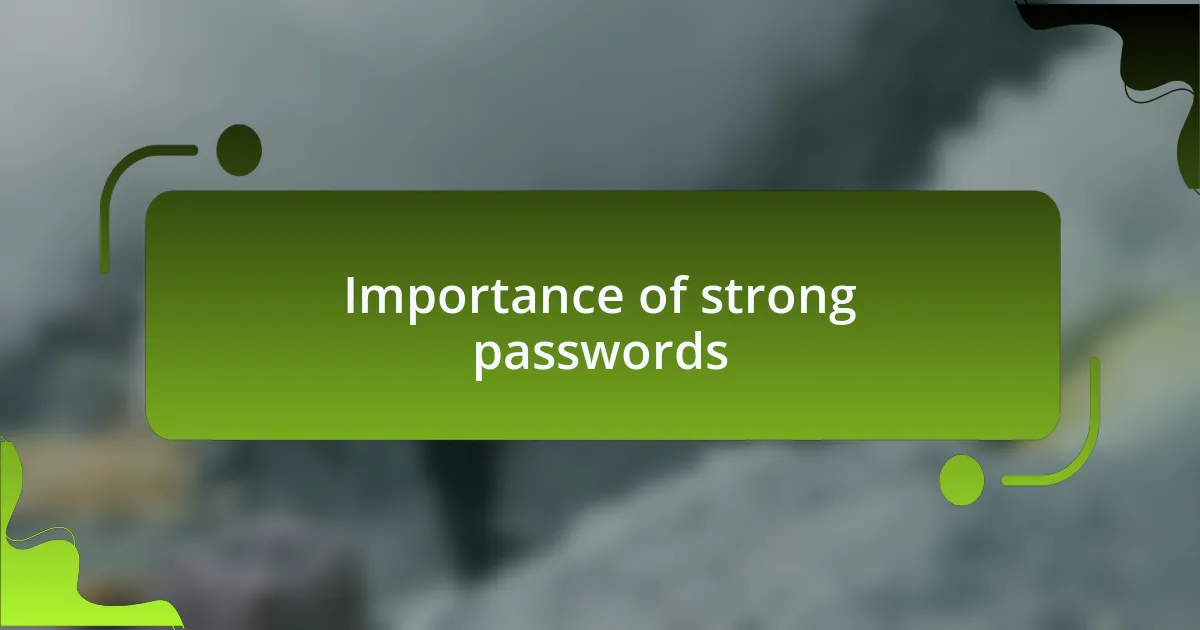
Importance of strong passwords
Creating strong passwords is fundamental to safeguarding not just our online accounts, but also our financial investments, especially in something as volatile as crypto mining. I remember the nervousness I felt after hearing about a major hack on a popular exchange; a few days later, I realized I had been using a similar password. That experience hit home, making me appreciate how a robust password can quite literally be the line between financial security and vulnerability.
The reality is, weak passwords are an open invitation for cybercriminals. Have you ever thought about how many online platforms we use? Each account presents a potential weak point if our passwords are easily guessable or repeated across different sites. In my own experience, diversifying my passwords has not only fortified my accounts but has also given me peace of mind when engaging in crypto transactions.
Moreover, the emotional weight of a compromised account can be immense. I once assisted a colleague in recovering their account after a breach, and the frustration and anxiety they felt were palpable. It reinforced my belief that investing time in creating strong passwords is a small price to pay for the security and tranquility that come with knowing I’m doing my best to protect my assets.
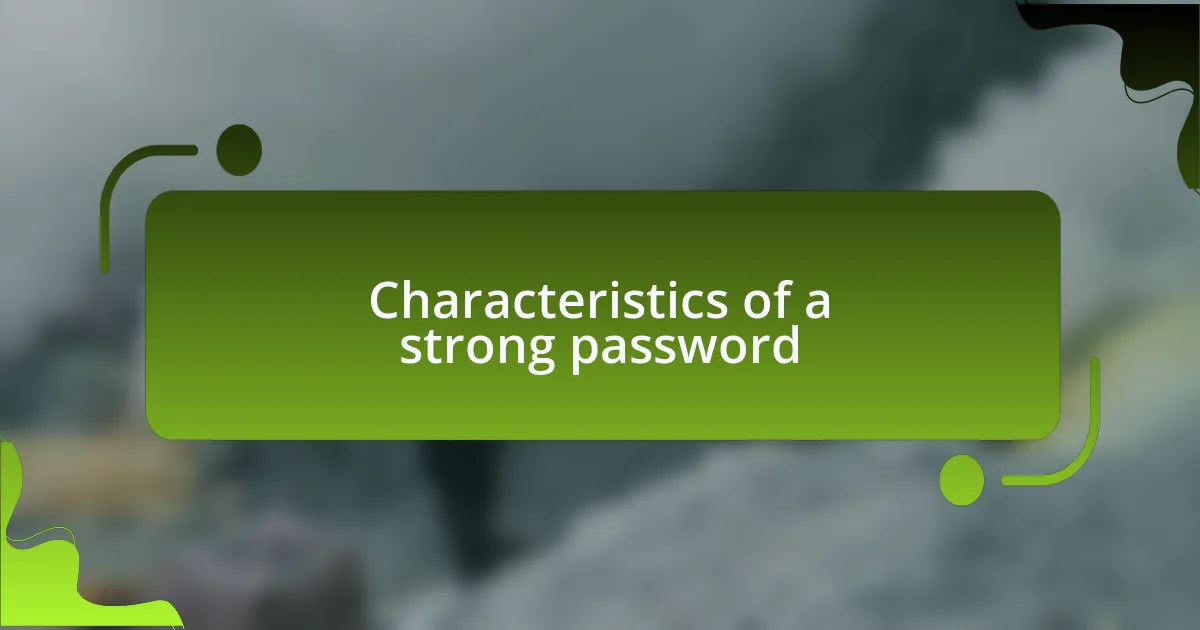
Characteristics of a strong password
A strong password has several key characteristics, but perhaps the most important is its length. I typically aim for at least 12 to 16 characters, mixing uppercase and lowercase letters, numbers, and symbols. It’s interesting how a simple shift in thinking—like considering a longer passphrase instead of a single word—can drastically enhance security. Have you ever tried turning a memorable quote from your favorite movie into a password? It’s both fun and effective!
Another essential trait of a strong password is unpredictability. I always pay attention to avoid using obvious information, like birthdays or pet names, which can be easily discovered. Once, I decided to challenge myself by choosing random words from different languages and combining them into a cohesive password. The process was not only engaging but made it difficult for anyone to guess, even if they had some context about me.
Using distinct passwords for every account is a practice I swear by. After a minor incident where I reused a password across several platforms, I realized how risky that habit could be. The experience taught me that a unique password acts like a safeguard, so even if one account is compromised, the others remain secure. It’s a simple but effective way to maintain a strong defense against potential breaches.
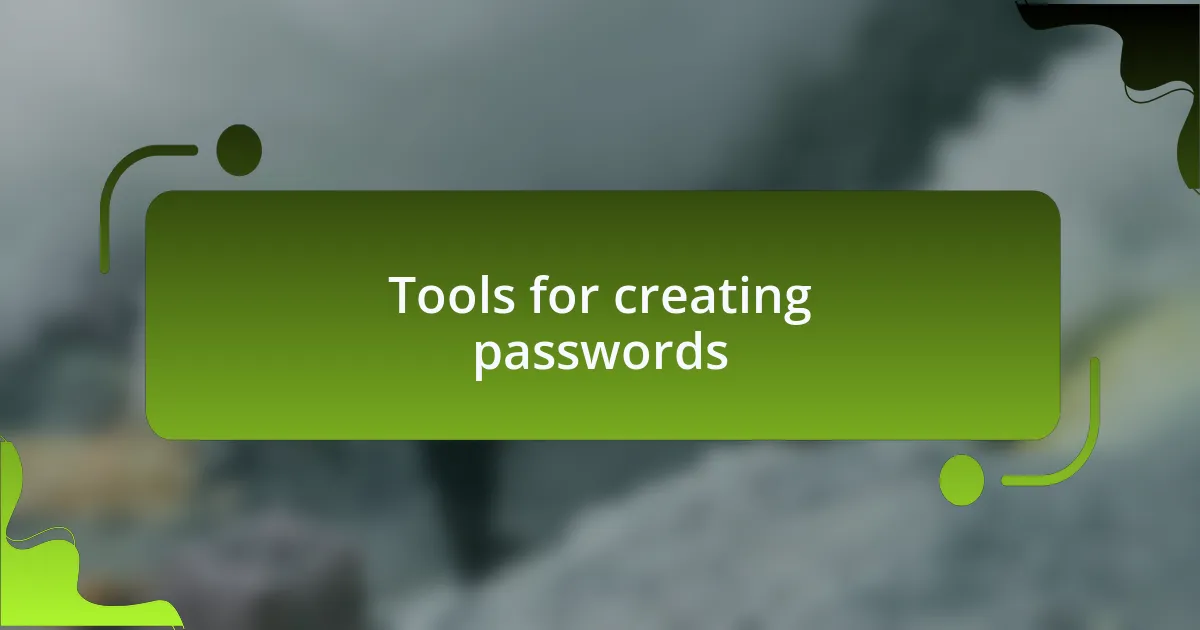
Tools for creating passwords
When it comes to tools for creating strong passwords, I’ve found password managers to be incredibly useful. These applications not only generate complex passwords but also store them securely, so I don’t have to memorize every single one. It’s almost like having a digital vault where I can keep my secrets safe. Have you ever considered how much time and mental energy you could save by letting a tool do the heavy lifting for you?
There are also various online password generators that I often experiment with. They allow me to customize the length and complexity of the passwords, making the whole process feel like a game. I remember the first time I generated a password that was a mix of characters, numbers, and symbols—it felt empowering to know I was taking a proactive step in protecting my accounts. The randomness can truly be a thrill, as it leads to a unique outcome every time.
Finally, I can’t overlook the built-in features in many browsers that offer password suggestions. While they might not be as robust as dedicated password managers, I appreciate the convenience they provide during the sign-up process. Have you ever clicked “suggest a password” and been surprised by the intricate combinations? It’s a reminder of how technology can assist us in making better security choices without overwhelming us in the process.
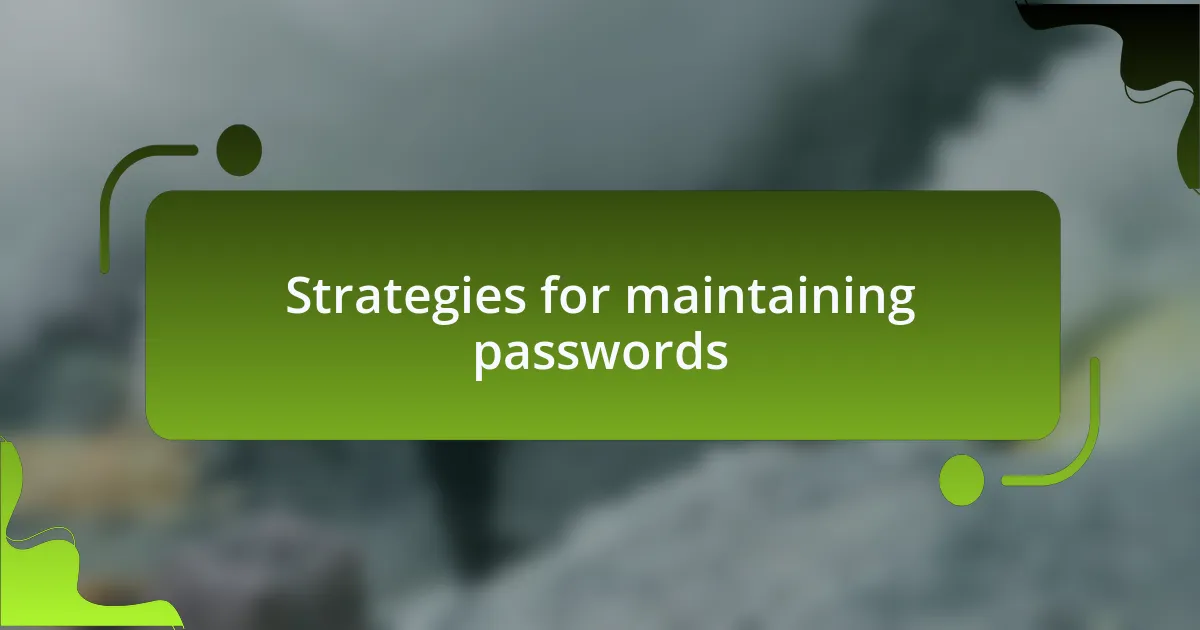
Strategies for maintaining passwords
One effective strategy for maintaining strong passwords is to change them regularly. I often set a reminder to update my passwords every few months. It’s a bit like rotating my home security codes; I feel more secure knowing I’m not relying on the same key for too long. Have you ever felt uneasy about an old password hanging around? The action of changing it gives me peace of mind.
Another essential aspect is to use two-factor authentication (2FA) whenever possible. I can’t tell you how many times I’ve been grateful for that extra layer of security—especially when a service I use sends me a text with a code to verify my identity. It feels almost like having a bodyguard for my online presence. Doesn’t the idea of double-checking your identity make you feel a bit safer?
Finally, I’ve learned to be cautious about where I enter my passwords. There have been instances when I clicked on suspicious links, only to be greeted by fake login pages. That moment of realization was nerve-wracking. Now, I always check the website URL before typing in any sensitive information. It’s a small habit, but it saves me from potential headaches later on. How often do you verify URLs before logging in? That extra step can be crucial for your security.
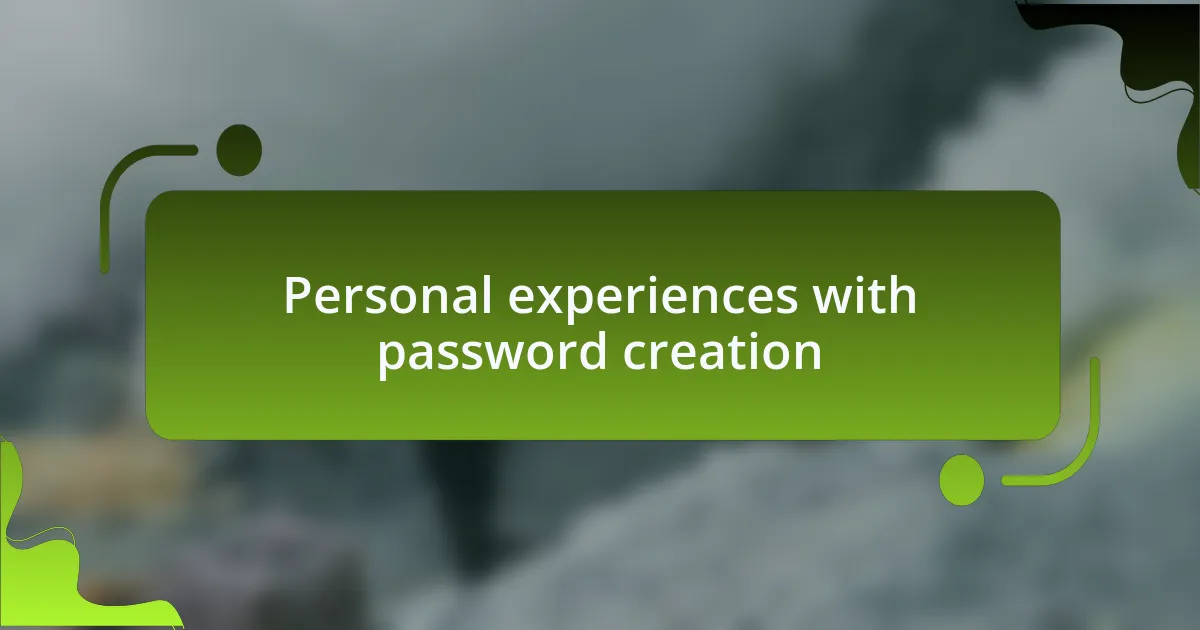
Personal experiences with password creation
When I first started creating strong passwords, it felt like a challenge to balance complexity with memorability. I remember trying to use a phrase from my favorite book and tweaking it with numbers and symbols. It was surprisingly satisfying when I finally settled on a password that felt both secure and something I could easily recall. Have you ever created a password so good that you couldn’t help but smile at your own creativity?
I also recall a time when I relied too heavily on password managers. While they are incredibly convenient, I once neglected to master my own passwords because I simply saved everything. When I lost access to my password manager momentarily, I panicked, scrambling to remember my passwords. That experience taught me the importance of being proactive in understanding my own security setup. Have you faced a similar moment of panic?
Ultimately, I’ve learned to embrace the practice of storytelling in my password creation. I use personal anecdotes or memorable events to craft secure phrases. For instance, I might incorporate the year I traveled somewhere special or a family joke into the mix. This approach not only boosts security but also adds a touch of nostalgia and sentimentality. How do you personalize your approach to password creation? It can really transform the task into something meaningful.
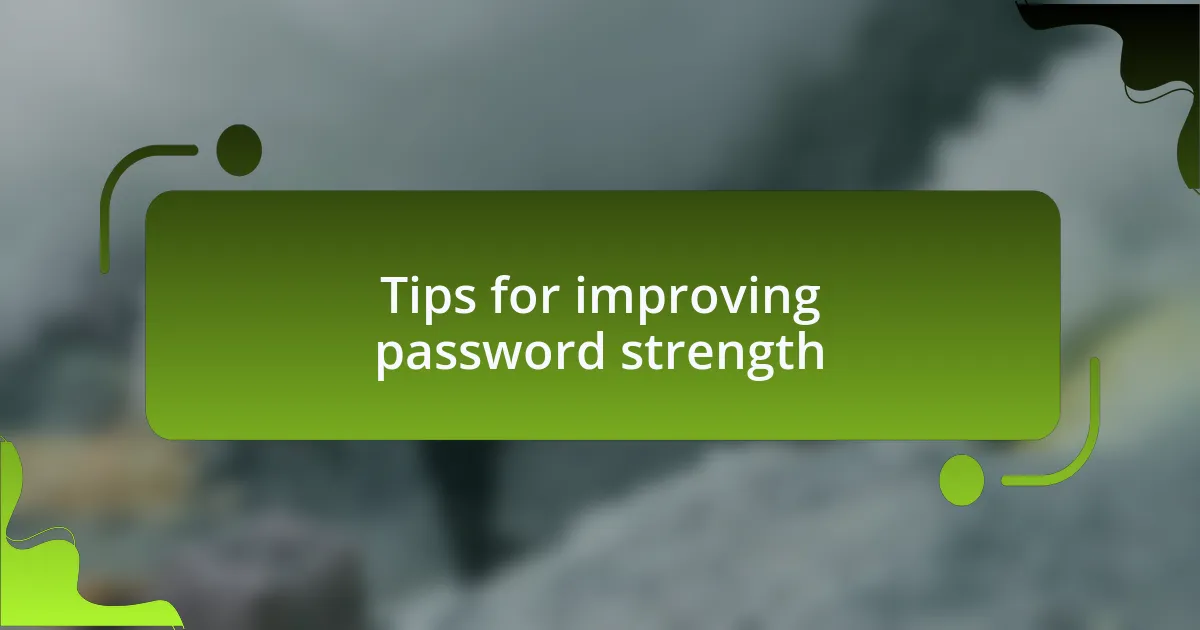
Tips for improving password strength
One crucial tip for improving password strength is to make your password at least twelve characters long. I once fell into the trap of thinking shorter passwords were easier to remember, but then I realized that hackers often use automated tools to crack them in seconds. It’s amazing how a few extra characters can significantly enhance security. Have you ever thought about how a longer password might give you that peace of mind?
Using a blend of uppercase and lowercase letters, numbers, and special characters can create a password that’s both challenging to crack and easier to remember. For example, I’ve found that combining random phrases with unique twists, like substituting “and” with the “&” symbol, helps. Think about it: if you use something meaningful to you, like “MyDogLovesToPlay&Fetch9,” it becomes not just secure but also a reflection of your life. What creative combinations will you come up with?
Another strategy I swear by is avoiding the use of easily accessible personal information, such as birthdays or names. I remember the time I made that mistake with a password that included my child’s name. It felt secure at the time, but then I realized how easy it would be for someone who knew me to guess it. Can you relate? Instead, I now focus on using abstract memories or words that don’t relate directly to me, which adds a layer of obscurity and safety. How will you shift your approach to include this tip?